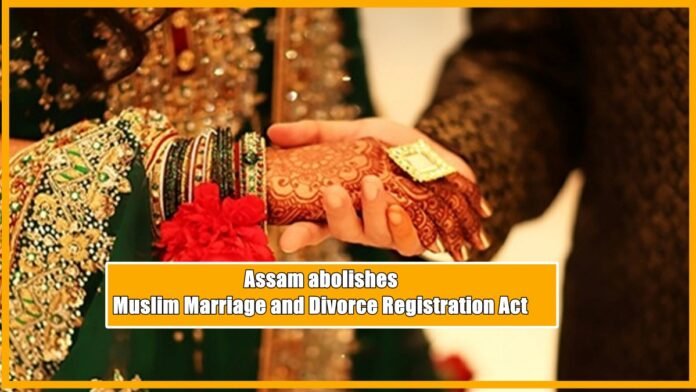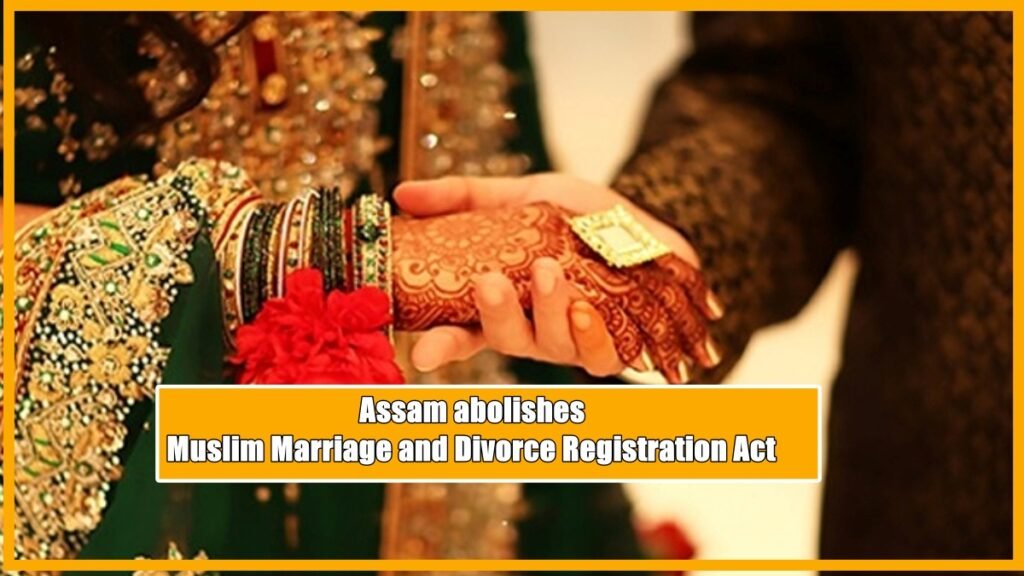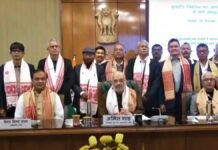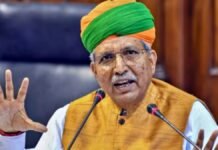
The Assam government has scrapped the Muslim Marriage and Divorce Registration Act, of 1935, a colonial-era law that regulated the registration of marriage and divorce of Muslims in the state. The decision was taken in a cabinet meeting on Monday, February 26, 2024. The government has claimed that the move is aimed at curbing child marriage and bringing uniformity to the civil code. However, some critics have questioned the rationale and timing of the decision and its impact on the rights and identity of the Muslim community in Assam.
What was the Muslim Marriage and Divorce Registration Act, of 1935?
The British government enacted the Muslim Marriage and Divorce Registration Act of 1935 for the then province of Assam, which included present-day Assam, Meghalaya, Nagaland, and parts of Arunachal Pradesh and Mizoram. The Act provided for the registration of marriage and divorce of Muslims by the state government through licensed Muslim Registrars, who were government employees. The Act also laid down the procedure and provisions for applications related to nikah (marriage) and talaq (divorce) by Muslims.
The Act was amended in 2010 by the then Congress-led government in Assam, which made the registration of marriage and divorce of Muslims compulsory instead of voluntary. The amendment was intended to protect the rights of Muslim women and children, especially in cases of polygamy and triple talaq.
Why did the government abolish the Act?
The Assam government, led by Chief Minister Himanta Biswa Sarma of the Bharatiya Janata Party (BJP), has cited two main reasons for abolishing the Act: to prevent child marriage and to pave the way for a Uniform Civil Code (UCC).
According to the government, the Act had some provisions that allowed minors to get married with the consent of their legal guardians, even if they did not meet the legal age of marriage in India, which is 18 years for girls and 21 years for boys. The government said that this was encouraging child marriage among Muslims, which had adverse effects on their health, education, and empowerment.
The government also said that the Act was creating a parallel legal system for Muslims, which was against the principle of equality and justice. The government argued that the Act was redundant and unnecessary, as Muslims could get their marriage and divorce registered under the Special Marriage Act, 1954, which applies to all citizens of India irrespective of their religion.
The government has expressed its support for a UCC, which would replace the personal laws of different religious communities with a common set of laws governing marriage, divorce, inheritance, adoption, and other civil matters. The government has said that a UCC would ensure uniformity, harmony, and national integration.
What are the criticisms of the decision?
The decision to abolish the Act has faced opposition from some quarters, especially from the Muslim community and some civil society groups. They have raised the following concerns:
- The decision was taken without consulting the stakeholders, especially the Muslim community, which constitutes about 34% of the population of Assam, according to the 2011 census. They have alleged that the decision was arbitrary, unilateral, and undemocratic violating their constitutional right to freedom of religion and personal law.
- The decision was motivated by political and communal considerations, rather than social welfare and reform. They have accused the government of targeting the Muslim community, particularly those of Bengali origin, who have been facing allegations of being illegal immigrants or Bangladeshis by some nationalist parties and groups in Assam. They have claimed that the decision was part of the government’s agenda to marginalize and alienate the Muslim community and to polarize the society along religious lines ahead of the 2024 general elections.
- The decision was based on false and exaggerated claims of child marriage among Muslims. They have pointed out that the Act did not permit child marriage, but only provided for its registration, and that the legal guardians had to produce proof of age and consent of the parties before applying for registration. They have also cited data from the National Family Health Survey (NFHS) 2015-16, which showed that the prevalence of child marriage among Muslims in Assam was lower than the national average and comparable to other communities in the state.
- The decision was not in line with the spirit and purpose of the UCC, which is to ensure equality and justice for all citizens, regardless of their religion, caste, gender, or class. They have argued that the UCC should not be imposed by the state, but evolved through a consultative and participatory process, considering the country’s diversity and pluralism. They have also stressed that the UCC should not be seen as a uniform code, but as a common code, which would respect and accommodate the specificities and sensitivities of different communities, while ensuring their fundamental rights and freedoms.























































